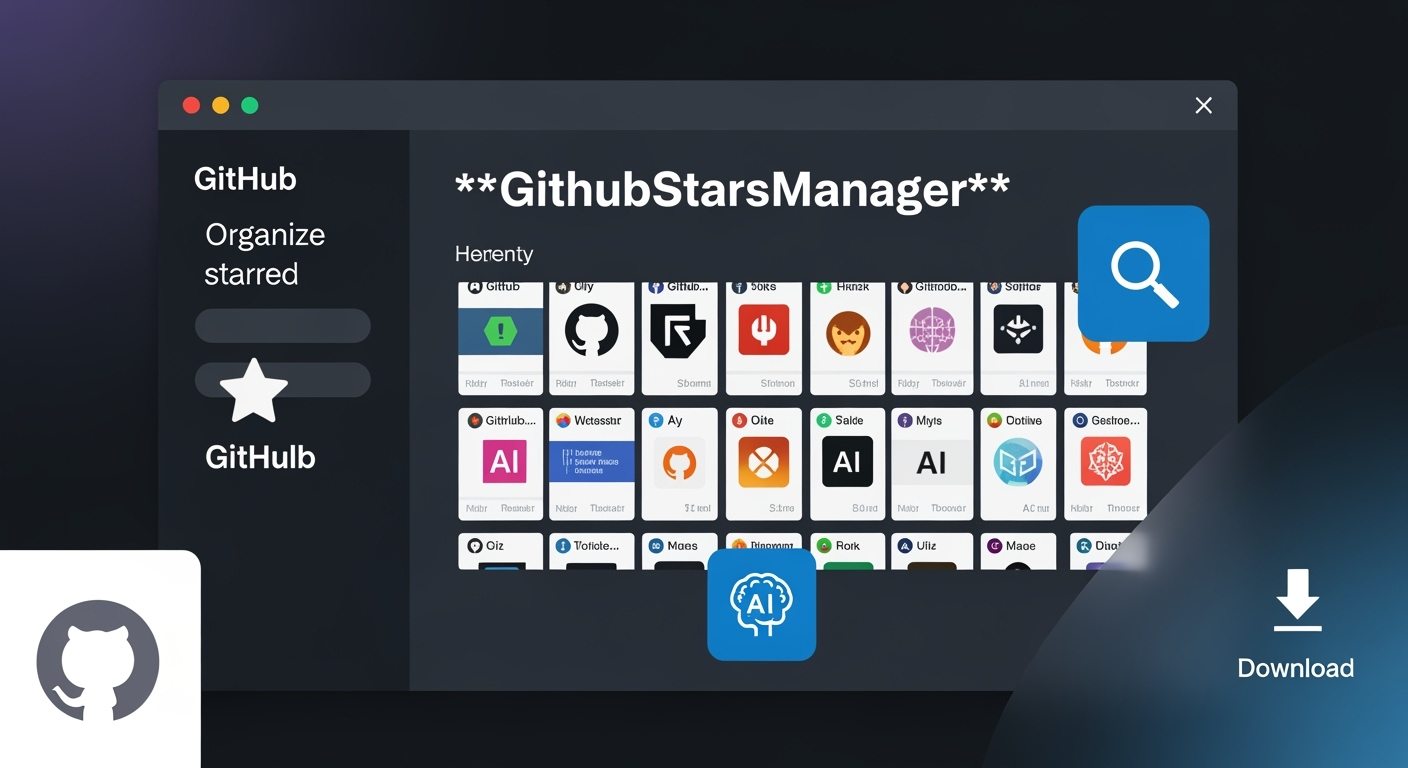Stop losing important repos in a sea of stars
If you ever starred a dozen projects and next week couldn’t find the one you actually needed, you’re not alone. GitHubStarsManager turns your chaotic list of starred repositories into an organized, searchable library — using AI to summarize, categorize, and surface the repos that matter.
What it does
GithubStarsManager is a desktop and web-capable application that syncs your GitHub starred repositories and adds an intelligence layer on top of them. Instead of relying on manual tags or hunting through an endless stars list, the app:
- Automatically syncs starred repos from your GitHub account
- Uses AI to generate short summaries and categorize repositories
- Provides semantic search — find repos by meaning, not just keywords
- Tracks releases for starred repos and lets you filter and download release assets
- Supports custom OpenAI‑compatible AI model APIs and WebDAV setups
“Smarter than manual tags, simpler than GitHub.”
Who it’s for
This project is aimed at developers and power users who have accumulated dozens — or thousands — of starred repositories and need an easier way to manage them. Common users include:
- Developers with large collections of starred repos who want fast discovery
- Maintainers who track upstream releases and need asset filters or quick downloads
- Researchers or product teams collecting reference projects and examples
- “Lazy‑efficient” users who prefer automation (AI summaries, auto categorization) over manual tagging
Skill level: Beginner-to-intermediate for end users (desktop client available). Developer-level familiarity (Node.js, Docker) is useful for local builds or running the service from source.
How it works
At a high level, GithubStarsManager operates as a synced client that fetches your starred repositories from GitHub and augments them with AI‑generated metadata. Key technical aspects discovered in the repository:
- Cross-platform desktop client (Electron-based builds are included — see electron-builder.yml)
- Modern web toolchain: Vite, TypeScript configuration files (tsconfig.*), and Tailwind CSS for UI styling (tailwind.config.js)
- AI integration: supports OpenAI-compatible APIs so you can plug in hosted models or custom endpoints
- Release tracking: the app subscribes and surfaces release information; Docker support helps avoid CORS issues when calling AI or WebDAV services
- Local-first data approach: repo advertises “100% local data” — the app is designed to store metadata locally for privacy and offline access
Architecture (accessible overview)
The repository contains a frontend built with Vite and TypeScript, packaging config for Electron to produce desktop binaries, and Docker/Docker Compose files for running a production-ready backend or reverse proxy. AI calls are abstracted to OpenAI‑compatible endpoints so you can swap providers, and WebDAV integration enables storing attachments and release assets in your preferred remote storage.
Getting started
Below are the two common ways to run GithubStarsManager: locally for development and via Docker for a self-contained deployment.
Run locally (development)
<!-- Clone and run in development mode -->
# Clone the repository
git clone https://github.com/AmintaCCCP/GithubStarsManager.git
cd GithubStarsManager
# Install dependencies
npm install
# Start development server
npm run dev
Note: When running with npm run dev some AI service calls and WebDAV requests may be blocked by CORS. The repository recommends using the prebuilt desktop client or running inside Docker to avoid CORS problems.
Run with Docker
<!-- Run using Docker (refer to DOCKER.md in the repo for full details) -->
# Build and start with docker-compose (example)
docker-compose up --build -d
# Or build an individual Docker image
docker build -t githubstarsmanager:latest .
docker run -p 3000:3000 githubstarsmanager:latest
If you prefer a ready-made client, download the desktop releases here: GithubStarsManager Releases.
Key features
- AI summaries & categorization — quick human-readable descriptions of each starred project
- Semantic search — search by intent (e.g., “auth library for Go”) rather than exact text
- Release subscriptions — follow release activity and download assets with filters
- Custom AI models — plug OpenAI-compatible endpoints or private models
- Cross-platform — Electron packaging and Docker compose for broad platform support
- Local-first data — metadata stored locally to protect privacy and enable offline use
How it compares
Compared to manual star lists or browser bookmarks, GithubStarsManager automates discovery and maintenance. Compared to other lightweight bookmarking tools, its main differentiator is the AI layer and release-tracking features — which convert a passive star into a searchable, actionable resource.
Why it’s worth trying
The project shows active development and comes ready to use with prebuilt releases. Repository metrics and community signals (as surfaced in the repo):
- Commit history: the project indicates around 54 commits on main
- Releases: 6 releases are available for download
- Contributors: 2 contributors are listed in the repository graph
Practical benefit: spend less time searching through stars and more time using the projects you actually want.
Real-world usage scenarios include keeping a curated library of learning resources, tracking upstream tool updates for projects you depend on, or maintaining a tailored collection of examples and boilerplates for team onboarding. The ability to plug in a private AI model and WebDAV storage also makes it suitable for teams with data‑security requirements.
Final thoughts
GithubStarsManager hits a sweet spot for developers who value automation but also want control. It bridges the gap between passive bookmarking and an actively managed collection by combining release tracking, semantic search, and AI summaries — while offering multiple deployment options (desktop, Docker, or local dev builds).
If you want to try it now, grab the desktop release for the easiest experience, or follow the Docker instructions in the repository to run a self-hosted instance. For developers who want to extend the app, the source includes Vite, TypeScript, Electron configuration and Docker artifacts to get you started quickly.

